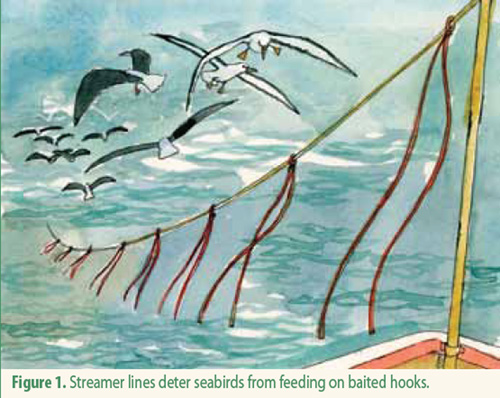It is said that it was a Japanese tuna-fishing captain who invented the bird-scaring streamer or tori line to deter scavenging seabirds from being hooked.
Publishing on-line this month in the journal Fisheries Science Kosuke Yokota, Hiroshi Minami amd Masashi Kiyota from the Japanese Fisheries Research Agency compare the efficacy of two designs of tori lines used in the Southern Bluefin Tuna fishery by Japanese fishers.
Their paper's abstract follows:
"To improve the performance of tori-lines (bird-scaring lines) in reducing incidental catch of large seabirds (albatrosses and giant petrels) in the pelagic longline fishery, we analyzed factors affecting the performance of tori-lines based on data collected by Japanese scientific observers in the southern bluefin tuna Thunnus maccoyii fishery from 2002 to 2005. We classified the variety of tori-lines by the main tori-line length and the streamer type. Two types of streamers were identified: type A, several long streamers made of nylon cord attached to the main tori-line by metal swivels; type B, many short streamers made of polypropylene packing bands braided into the main tori-line. In a model analysis, we found that the main tori-line length was an important factor affecting tori-line performance, and the two types of streamers had similar effectiveness. Since the light type B streamer has the advantage of practical feasibility, this type can be another option for use in tori-lines if used with a main tori-line of sufficient length."
Reference:
Yokota, K., Minami, H. & Kiyota, M. 2011. Effectiveness of tori-lines for further reduction of incidental catch of seabirds in pelagic longline fisheries. Fisheries Science DOI: 10.1007/s12562-011-0357-4.

John Cooper, ACAP Information Officer, 24 May 2011

 English
English  Français
Français  Español
Español